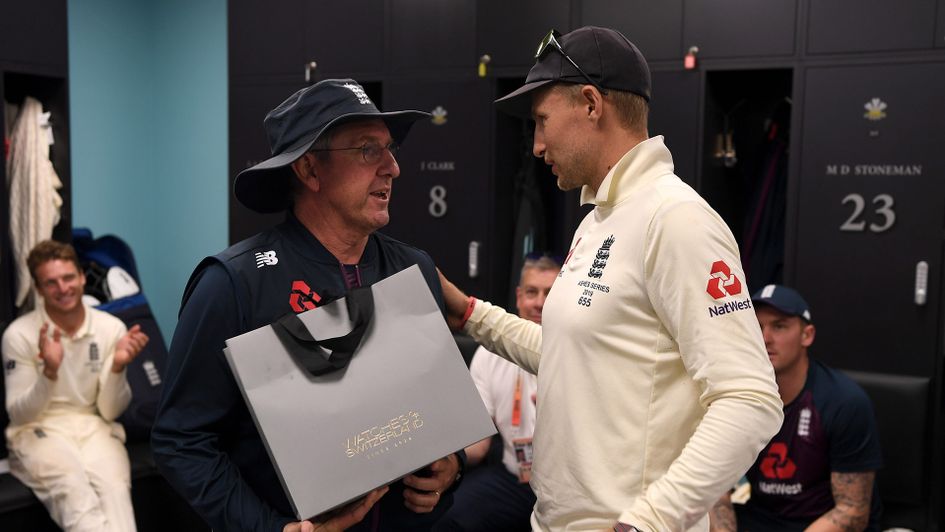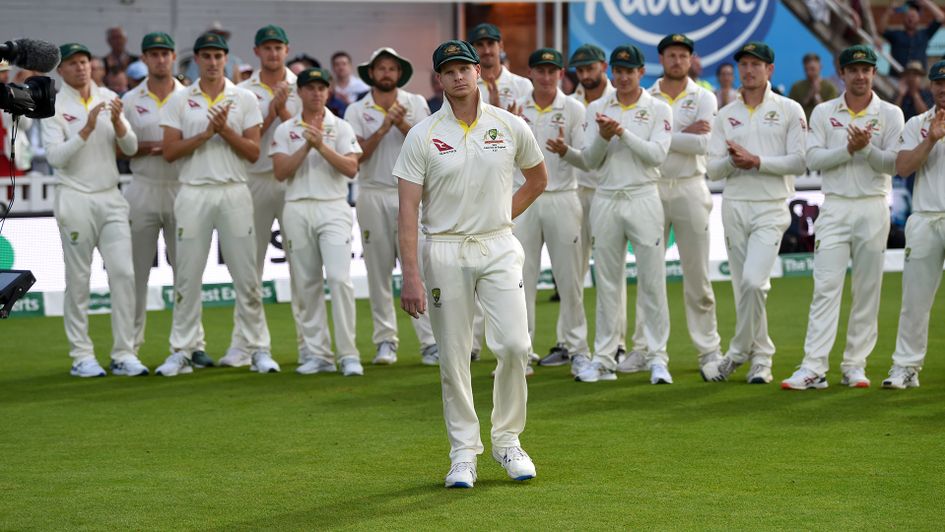
Summer reflections: Look back on England's victory at the Cricket World Cup and the subsequent Ashes series against Australia
With England's marathon summer of international cricket finally coming to an end, Richard Mann reflects on some of the highlights of a remarkable few months.
The wait is over
South Africa might be known as cricket's original 'chokers' having missed countless opportunities to win an ICC trophy over the years, the likes of Allan Donald, Jacques Kallis, Dale Steyn and AB de Villiers all promising the world yet somehow contriving to keep their demanding fans waiting, but England weren't too far behind until Trevor Bayliss took over as head coach in 2015.
England finished runners-up at the 1979, 1987 and 1992 World Cups as major-tournament success evaded the likes of Graham Gooch and Sir Ian Botham through what was a golden generation for English cricket.
As the late nineties and early 2000s came and went, it appeared the wait would go on and on and a run to the quarter-finals in India in 2011 was as good as it got thereafter as England's white-ball fortunes went from bad to worse and their cricket - and the style in which it was played - fell further behind the rest of the world.
The arrival of Bayliss changed all that with his employers at the ECB demanding a heightened focus on white-ball cricket and the improvements were both seismic and swift as England marched to the final of the T20 World Cup in 2016, a fearless approach with the bat mixed with aggressive bowling and dynamic fielding seeing England establish themselves as the dominant force in limited-overs formats.
We shouldn't have been surprised. Bayliss came with a glowing pedigree from his time with Sri Lanka and in the Indian Premier League, where he coach Kolkata Knight Riders through a period of sustained success.
Nevertheless, English fans lapped it up and got behind a side who were expertly led by Eoin Morgan, an innovative and positive captain who was the perfect partner in crime for Bayliss, and the results continued to suggest that a first ICC event victory was just around the corner.

In 2016 England posted a world record score of 444-3 in their ODI with Pakistan at Trent Bridge and even when they lost the Ashes in the winter of 2017/2018, they won the subsequent ODI series 4-1 with more brazen cricket.
A sobering defeat to Pakistan in the semi-finals of the Champions Trophy was another chance fluffed - England had been strong favourites to win the event long before it started - but that loss proved to be nothing more than a bump in the road to winning the ultimate prize in white-ball cricket.
For Bayliss, a man brought in to revive the fortunes of the one-day side, it proved to be mission accomplished as England came back from the dead on more than one occasion to be crowned Cricket World Cup champions on an unforgettable Sunday afternoon at Lord's in July.
Earlier defeats to Pakistan, Sri Lanka and Australia had threatened to end English hopes before the knockout stages but Bayliss had laid solid foundations, a group of players who were brave and resilient, and they fought their way to the final where they and New Zealand put cricket back on the front pages by producing one of the most thrilling and dramatic sporting finishes in memory.
As would be the running theme for the rest of the summer, Ben Stokes was the hero as he rescued England's run chase of 241 with a nerveless 84 not out that featured a mix of brutal power and hard running, doing just enough to ensure the scores were tied and force the subsequent Super Over.
The drama had bubbled away all day, from Tim Southee's electric catch to the four overthrows that ultimately kept England in the match, as Stokes threw himself into a desperate dive to make his ground, only for the ball to ricochet off the bat and roll away to the boundary.
It was a rough luck for New Zealand, a fine side who were wonderfully led by Kane Williamson and deserved better having continually proved the doubters wrong as they made their second consecutive World Cup final.
Despite being obviously drained, Stokes dusted himself down and reappeared with Buttler as England scored 15 from Trent Boult's Super Over, but when New Zealand required two to win from Jofra Archer's final ball, it appeared that English hearts would be broken once more.
However, Martin Guptill swung Archer's leg-stump yorker into the leg side and Jason Roy redeemed two earlier fumbles with a clean pick up and throw that was brilliantly gathered by Buttler behind the stumps.
Guptill was short of his ground and the scores were again tied, but having scored more boundaries in the match, victory was England's and the World Cup finally theirs.
🙌🏴 The incredible run out which won England their first Cricket World Cup with the last ball of the Super Over!
— Sporting Life (@SportingLife) July 14, 2019
🏆 You couldn't win any World Cup in a more dramatic way than this...#WeAreEngland #ENGvNZ #CWC19 pic.twitter.com/3zjdjwrC8C
It was sporting theatre at its best and most dramatic and there really didn't deserve to be a loser.
Williamson's side had played their part in the greatest World Cup final of all time, in the biggest match of their lives, and despite falling short by the narrowest of margins and in the most cruel way imaginable, they took defeat with grace and humility. As ever, Williamson and his side were all class.
As for England, four years of planning following their disastrous World Cup campaign in Australia had come to fruition, the World Cup trophy deserving reward for their complete dominance in the 50-over form of the game over a sustained period.
For all that, they required something special from Stokes to get them over the line. It would not be the last time he was called upon to produce the unthinkable as the very embodiment of England's renaissance as a cricketing nation rose to new heights - and hauled his team-mates along with him.
Ashes fever takes over
After just over six weeks of Ashes cricket, played hard and with a great of skill, the series finished 2-2 but with Australia retaining the urn.
In truth, that probably feels like a fair enough result. Australia were the better side for a lot of the series, albeit not by much, and while the series ending in a draw might seem a little rough on Tim Paine's side, the narrow level of their superiority probably justifies the retention of the urn but not by virtue of winning the series outright.
For much of the series, they did set the pace, winning the first Test at Edgbaston, dominating large parts of the third Test in Leeds before letting victory slip through their fingers, going back in front in Manchester to retain the Ashes and then failing to hold onto their lead at The Oval as England restored parity.
As Paine and his team reflect on what might have been on the long flight home, there are sure to be some regrets to have not been the first Australian side to win in England since 2001, but to dwell on what they failed to achieve would be to do a disservice to what they have achieved.
When you throw into the mix everything that this group of players have had to overcome in the last 18 months, from the ball-tampering scandal at Newlands, the subsequent resignations of their captain and coach and the bans to star batsmen Steve Smith and David Warner, the turnaround in their fortunes has been remarkable.
As recently as last winter, Australia were outplayed by India at home and for all the returns of Smith and Warner were always going to boost their flaky batting line-up, it was hard to see them defying an England attack armed with a Dukes ball in English conditions.
In truth, you could argue that they didn't as Warner in particular failed to contribute, but in Smith, they have in their ranks one of the best Test match batsmen of all time. His twin hundreds in Birmingham proved the difference between winning and losing that series opener and, in the end, it was Smith's performances which ensured the urn would remain in Australia.
He continued his relentless pursuit of runs in the subsequent weeks, overcoming concussion incurred from a nasty blow from Archer at Lord's to finish as the leading runscorer on either side, his 774 runs coming at an average of 110.57 and including three centuries and a top score off 211.

Smith is already firmly established as one of the all-time batting greats and while it is far too easy to put players in that category, he is well on his way to ending his career as the finest Test batsman of his generation.
Having watched Virat Kohli light up these shores last summer, it is hard to imagine a better player in the game but Smith is currently eclipsing even him and a Test average of 64.56 as he enters what should be the most productive spell of his career suggests he might end it with a reputation taller than even the likes of Brian Lara and Sachin Tendulkar.
That debate is one for another day but what is clear is that without his mountain of runs this summer, Australia's brittle batting wouldn't have had enough firepower to win two Test matches, despite a bowling attack which leaves with its reputation greatly enhanced.
In Pat Cummins, Australia have the best bowler in the sport and for all their think tank rotated their quicks throughout the series, the invaluable Cummins wasn't afforded a rest, sending down 211 overs as he finished the series as the leading wicket-taker with 29 scalps.
Cummins' ability to seam the new ball and swing the old ball, go from attack to defence, from 'channel' bowling to a short-pitched barrage in the blink of an eye, sets him apart from anyone else in world cricket right now and his pace, which exceeded 90mph at times, rarely dipped despite his heavy workload.
🇦🇺🔴 Australia's five leading wicket-takers of the #Ashes
— Sporting Life (@SportingLife) September 15, 2019
1⃣ Cummins: 29/569 (Best: 4/32, Average: 19.62)
2⃣ Hazlewood: 20/437 (Best: 5/30, Ave: 21.85)
3⃣ Lyon: 20/668 (Best: 6/49, Ave: 33.40)
4⃣ Marsh: 7/86 (Best: 7/86, Ave: 12.28)
5⃣ Siddle: 7/295 (Best: 2/52, Ave: 42.14) pic.twitter.com/aLNhxAZuuF
In any other summer, he would have been a deserving Man of the Series but Smith's dominance means he rightly received the Australian gong while, unsurprisingly, Stokes was the recipient of the award for England.
441 runs at an average of 55.12, along with eight wickets and a herculean, marathon spell of bowling at Headingley, reinforced the feeling that Stokes remains the heartbeat of this England team and when many around him struggled to last the pace in a gruelling summer that had already included a World Cup win, the Durham all-rounder, whose burden was the greatest of all, stayed the pace and took a crucial catch to dismiss Smith in the second innings of the final Test.
His unbeaten 135 at Headingley guided England to an unlikely and, in the end, incredible run chase of 362-9 that kept England's Ashes hopes alive and ignited a series that captured the public's imagination close to the level we had seen back in that famous 2005 series.
Headingley, home to so many famous Ashes memories already, was bathed in sunshine on that August Bank Holiday Sunday as Stokes appeared powerless to stop Australia's drive towards victory before he somehow managed to summon his last stand, firstly taking the attack to Nathan Lyon and Josh Hazlewood before he and number 11 Jack Leach inched England over the winning line.
As Stokes said afterwards, it was hard to imagine anything coming close to the atmosphere of the World Cup final but here, with Ashes cricket at its best, Stokes had managed it and the series was well and truly alive just as it had been set to die.
In the ten days between Leeds and the fourth Test at Old Trafford, Ashes fever had taken over the country, social media buzzing at the events at Headingley and Stokes having become front page news.
England's subsequent defeat Manchester was a shame for a number of reasons, not least because it ended their chance of regaining the urn before the final act, but for a short while cricket was back in the headlines, casual fans becoming avid followers and all with a new hero to idolise.
For the second time in the space of a few months, that man was Stokes, and his wholehearted efforts ensured England didn't finish a World Cup-winning summer with Ashes defeat and that cricket had more than one moment in the sun.
🏴👍 Levelling the #Ashes at least means the heroics of Ben Stokes and Jack Leach at Headingley weren't for nothing... pic.twitter.com/b2wKVVo5Px
— Sporting Life (@SportingLife) September 15, 2019
Pace is ace and the future bright
And so it is with great hope that England fans can look forward to a bright future with Stokes at the core of the side and Archer leading the bowling attack for years to come.
Whether we will see James Anderson again in an England shirt remains to be seen but his and Stuart Broad's brilliant careers are coming to an end and England have been desperate for new blood to step into their big shoes.
In Archer, it looks as if they have found their man and unlike so many that have have come before him, he is a genuinely quick fast bowler who will demand as much fear as he does respect.
His spiteful Saturday afternoon spell to Steve Smith at Lord's was as frightening and engrossing as anything we have seen since the likes of Brett Lee and Shoaib Akhtar were chasing the magical 100mph mark in the prime of their careers, and in finishing the series with 22 wickets from four matches, he proved that he has more strings to his bow than just bowling fast and short.
Five-wicket hauls at Headingley and The Oval showcased his wide range of skills and at the end of a long summer, it was heartening to see Archer deliver a searing eight-over spell to Matthew Wade on the final day of the series.
Archer topped 96mph in that spell, hitting Wade on the body and gloves, as he continued to charge in with menace and Root's biggest issue was convincing him to take a breather.
A player who will be in demand all around the world from various T20 franchises, and someone who England will see as a huge part of their future in all three forms of the game, how he is managed going forward will be crucial.
England haven't had a bowler of Archer's like for some time and if they are to regain the Ashes Down Under n 2021/22, they will need their fastest bowler on pitches that can be most unforgiving to those not able to bowl quick.
For the first time in years, England can match fire with fire in the pace stakes and assuming they can keep Archer fit, that offers renewed hope that the wait for the Ashes to be regained might not be as long as the Australians might expect.
Related links
- Fifth Test: Day four report
- Fifth Test: Day three report
- Fifth Test: Day two report
- Fifth Test: Day one report
- Richard Mann's latest Ashes diary
- Ashes: Test dates, venues & results
MOST READ
Next Off
Fixtures & Results



















